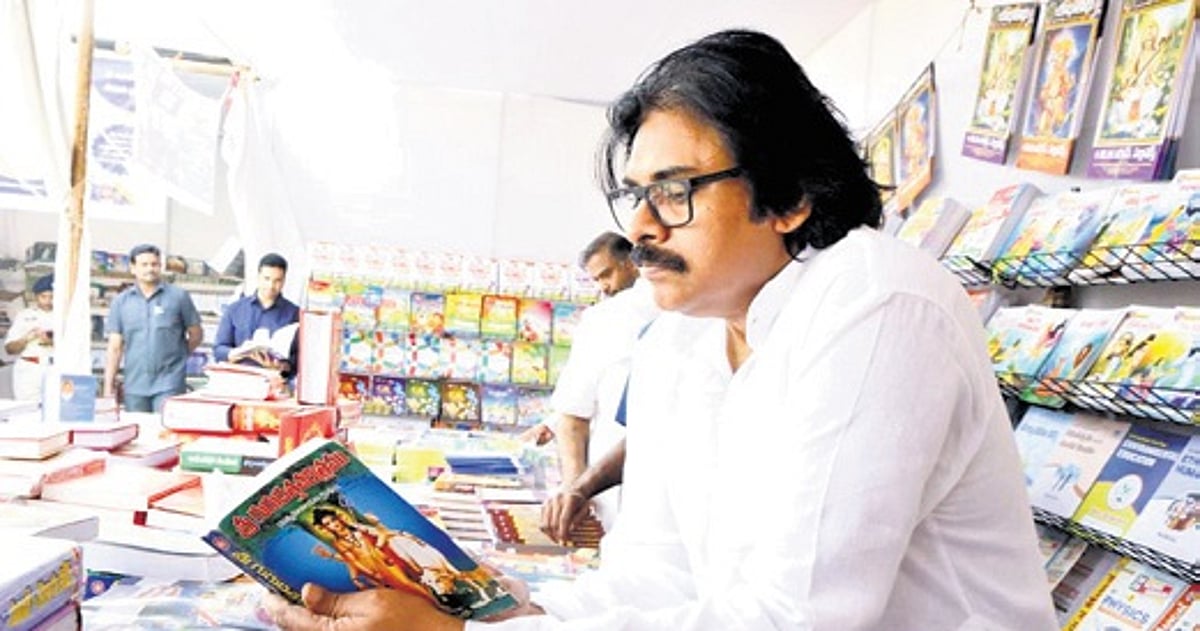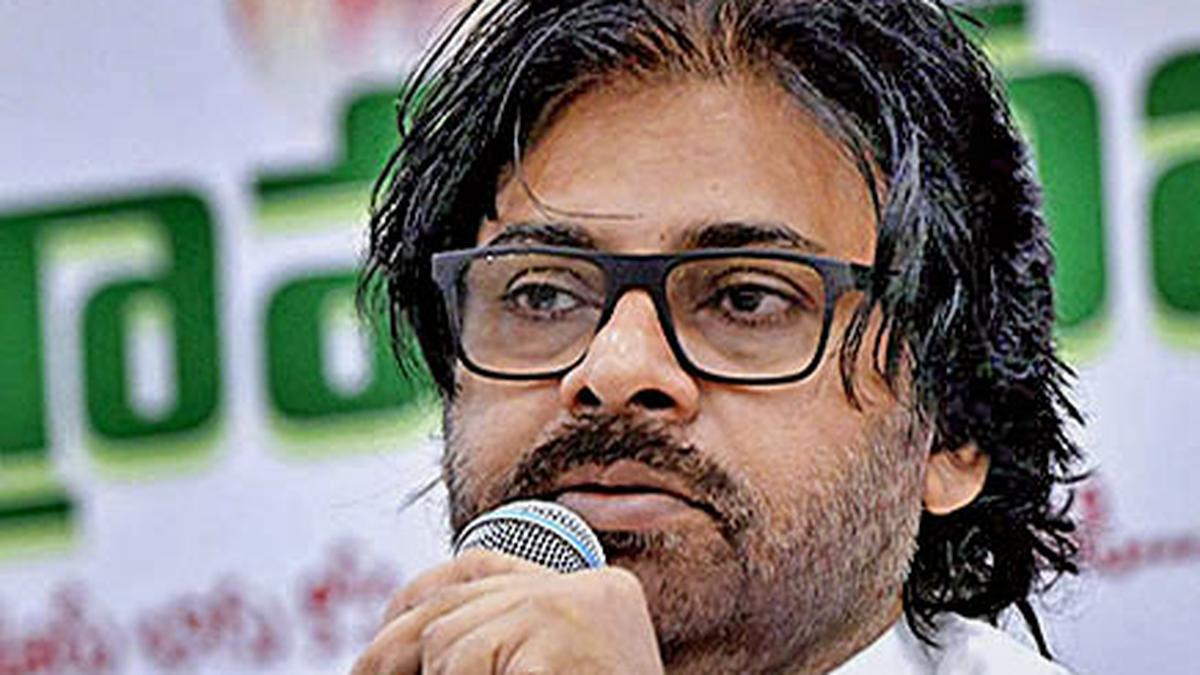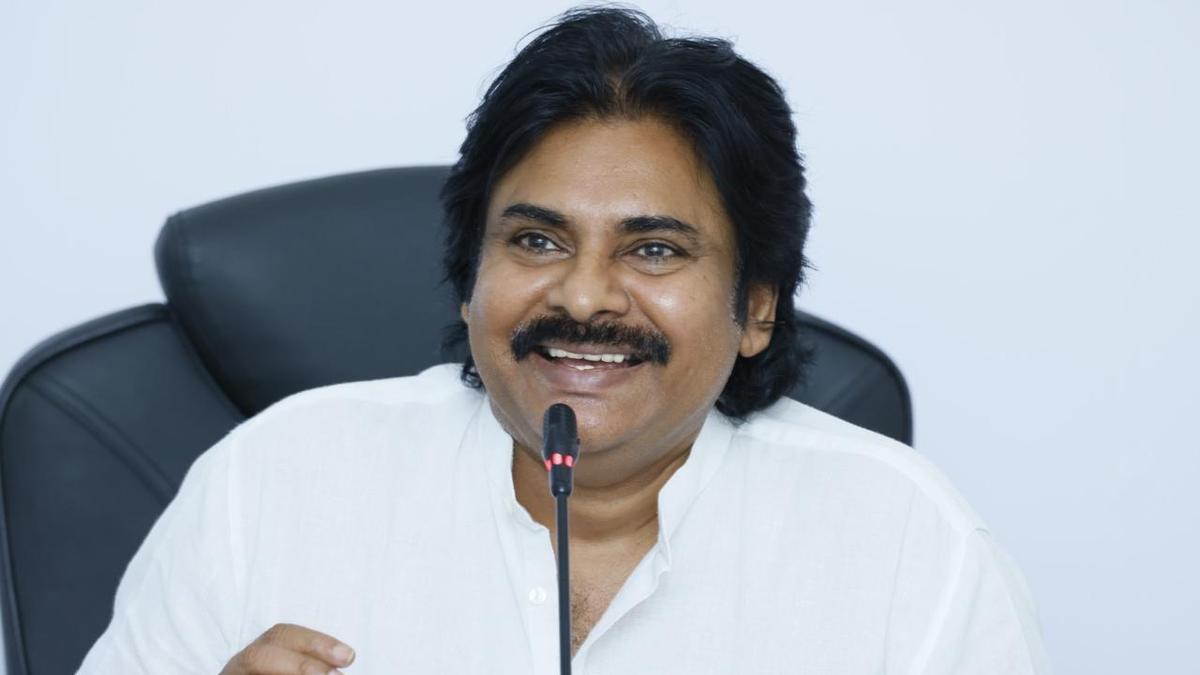When Pawan Kalyan, the charismatic Deputy Chief Minister of Andhra Pradesh, stepped into the Vijayawada Book Festival, it was not just a political figure making an appearance; it was a moment where passion for literature intersected with governance. Having a penchant for diverse reading, Kalyan explored numerous stalls, each offering a treasure of stories, ideas, and knowledge. What could a politician like him glean from these pages, and why does it matter to the citizens of Andhra Pradesh?
Pawan Kalyan's Literary Interests: More than Just Politics
Pawan Kalyan, a prominent figure in Indian politics, is not just a politician. He is also a passionate reader. Recently, he attended the 35th Vijayawada Book Fair. Here, he spent over two hours exploring a variety of book stalls. This event highlighted his diverse literary interests, which span multiple genres and languages.
Exploration of Various Genres
Kalyan's reading preferences are quite broad. He delves into numerous genres, including:
- Spiritual texts
- Historical literature
- Agricultural and environmental topics
- Analytical books
His selections reflect a holistic understanding of culture and governance. For instance, he has shown a particular interest in works that discuss Indian laws and public policy. This choice indicates that he values literature as a tool for personal and political growth.
Focus on Renowned and Emerging Authors
Pawan Kalyan does not limit himself to well-known authors. He also seeks out emerging voices in literature. This approach allows him to engage with fresh ideas and perspectives. At the book fair, he praised the book Man’s Search for Meaning by Dr. Viktor E. Frankl. He emphasized its inspiring message about resilience during tough times. This choice illustrates his appreciation for literature that offers deeper insights into the human experience.
Purchasing Books Across Multiple Languages
During his time at the book fair, Kalyan purchased books in three languages: Telugu, Hindi, and English. This multilingual approach showcases his commitment to embracing diverse literary traditions. By reading in different languages, he can connect with a wider range of authors and ideas.
His interest in Telugu literature is particularly noteworthy. It reflects a desire to promote local authors and stories. Kalyan's selections included dictionaries, ancient literature, and translated works. This variety demonstrates his belief that literature is essential for understanding different cultures.
The Importance of Literature in Society
Kalyan once stated,
"Literature is the foundation of a society's culture and values."This quote resonates deeply with his literary pursuits. He understands that literature shapes societal norms and influences governance. By engaging with literature, he enhances his knowledge and broadens his perspective.
His diverse literary interests also suggest a commitment to personal growth. Reading allows individuals to explore new ideas and challenge their beliefs. In Kalyan's case, it seems to play a crucial role in his political journey as well. Through literature, he can reflect on his experiences and refine his approach to leadership.
Conclusion
Pawan Kalyan's exploration of books at the Vijayawada Book Fair illustrates his multifaceted personality. His literary interests extend beyond mere politics. They encompass a deep appreciation for culture, history, and the human experience. By engaging with various genres and authors, he not only enriches his own life but also sets an example for others in the political arena.
In a world increasingly dominated by technology, Kalyan's commitment to reading is refreshing. It serves as a reminder of the importance of literature in shaping our understanding of the world. His journey through the pages of books is a testament to the power of words in influencing thoughts and actions.
Impact of Literature on Leadership and Governance
Literature plays a crucial role in shaping leadership and governance. It offers insights, fosters empathy, and helps leaders make informed decisions. In a world filled with complexity, leaders must rely on literature to guide their actions. After all, as one saying goes,
"A great leader is also a great reader."
The Importance of Informed Policy-Making Through Literature
Literature serves as a tool for informed policy-making. By reading various texts, leaders can understand different perspectives and challenges. This understanding is vital for crafting policies that truly address the needs of the people. Here are some key points:
- Broadened Perspectives: Literature exposes leaders to diverse viewpoints. This exposure helps them see beyond their own experiences.
- Enhanced Empathy: Reading fiction, in particular, allows leaders to step into others' shoes. This empathy is crucial for understanding the public's concerns.
- Informed Decisions: With a wealth of information at their fingertips, leaders can make decisions backed by evidence and insights from literature.
Informed policy-making is not just about numbers and statistics. It's about understanding the human element. Literature provides that connection, allowing leaders to relate to their constituents on a deeper level.
Examples of Literature Influencing Public Policy Decisions
Throughout history, literature has influenced public policy in significant ways. Here are a few notable examples:
- Uncle Tom's Cabin by Harriet Beecher Stowe: This novel played a pivotal role in shaping public opinion about slavery in the United States. It highlighted the moral dilemmas of the time and contributed to the abolitionist movement.
- The Jungle by Upton Sinclair: Sinclair’s expose on the meatpacking industry led to public outrage. This ultimately resulted in reforms and the establishment of food safety regulations.
- Silent Spring by Rachel Carson: Carson’s work raised awareness about environmental issues. It sparked changes in policies regarding pesticides and environmental protection.
These examples illustrate how literature can stir emotions and provoke thought, leading to significant societal changes. Leaders who engage with such texts can harness this power for the betterment of society.
Kalyan's Approach: Bridging Literature with Governance
Pawan Kalyan, the Deputy Chief Minister, is a notable figure who embodies the connection between literature and governance. He recently attended the 35th Vijayawada Book Festival, where he spent over two hours exploring various book stalls. His interest in literature is not merely a pastime; it reflects a commitment to informed leadership.
Kalyan's selections included books on Indian laws, public policy, and environmental challenges. This diverse reading list shows his dedication to understanding the complexities of governance. By engaging with literature, he aims to bridge the gap between theory and practice.
Moreover, Kalyan praised works like Man’s Search for Meaning by Dr. Viktor E. Frankl. This book emphasizes resilience during adversity, a quality essential for any leader. Kalyan’s approach highlights the importance of literature in fostering a deeper understanding of leadership challenges.
Conclusion
Reading can enhance empathy and understanding in leadership roles. Public figures like Kalyan derive actionable insights from literature, shaping their policies and decisions. As leaders continue to navigate complex issues, the influence of literature remains a powerful ally in governance.
Vijayawada Book Festival: A Hub of Cultural Exchange
The Vijayawada Book Festival, especially the recent 35th edition, stands out as a significant event for promoting Telugu literature and culture. This festival isn't just about books; it’s a vibrant celebration of ideas, stories, and connections. Thousands of attendees flock to this event, eager to explore the literary world. The sheer variety of participating authors, both local and national, showcases the rich tapestry of literature available.
Promoting Telugu Literature and Culture
At its core, the Vijayawada Book Festival plays a critical role in fostering Telugu literature. It provides a platform for local authors to share their works. This is vital for the preservation and promotion of the Telugu language. Festivals like this strengthen community ties. They bring people together, fostering a love for reading and writing.
Moreover, the festival encourages new voices in literature. Local authors often find opportunities to connect with publishers and readers. This interaction is crucial in a world where many talented writers struggle to get noticed. The festival acts as a launchpad for these authors, allowing them to showcase their talents.
Engagement of Political Leaders
The presence of political leaders at the festival adds another layer of significance. For instance, Deputy Chief Minister K Pawan Kalyan attended the 35th Vijayawada Book Fair. He spent over two hours exploring the various book stalls. This engagement from political figures highlights the importance of literature in shaping society.
Kalyan's interest in books on Indian laws, history, and public policy reflects a commitment to cultural and educational development. He even expressed admiration for works like "Man's Search for Meaning" by Dr. Viktor E. Frankl. His enthusiasm for literature encourages others to appreciate the written word. It also underscores the idea that literature can inspire resilience and understanding in challenging times.
Opportunities for Local Authors and Publishers
The festival creates a unique environment for local authors and publishers to thrive. With thousands in attendance, authors have the chance to reach a broader audience. This exposure is invaluable for those looking to make a mark in the literary world. The festival serves as a networking hub, allowing authors to connect with publishers, literary agents, and readers.
Additionally, the government’s support plays a pivotal role in these literary activities. When political leaders show interest, it often leads to increased funding and resources for such events. This support can transform the landscape of literature in the region, making it more accessible to aspiring writers.
The Impact of Cultural Festivals
Cultural festivals like the Vijayawada Book Festival do more than just celebrate literature. They promote community engagement and cultural exchange. Attendees often leave with new perspectives and a deeper appreciation for their heritage. The festival is a reminder that literature is not just about books; it’s about the stories that connect us all.
"Literary festivals are a vibrant showcase of our culture and heritage." - Vijayawada Book Fair Organizer
This quote encapsulates the essence of the Vijayawada Book Festival. It is a vibrant space where culture and literature intertwine. It showcases the richness of local talent while also embracing national narratives.
Conclusion
The 35th Vijayawada Book Fair was a resounding success. It attracted significant attention and participation, showcasing a diverse range of literature. The festival not only highlighted the importance of Telugu literature but also reinforced the idea that literature is a bridge between cultures. With ongoing support from political leaders and the community, the future looks bright for local authors and the literary scene in Vijayawada. As the festival continues to grow, it remains a crucial hub for cultural exchange, inspiring generations to come.



